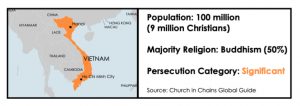
Vietnam has been a partner country of Irish Aid since 2005, receiving over €120 million in aid. The ruling communist party strictly controls all religion and does not tolerate political dissent. Various Buddhist groups operate openly in relative freedom, as does the Roman Catholic Church.
In 1945 the communist revolutionary leader Ho Chi Minh proclaimed independence from Japan, which had taken control of French Indochina in 1940. Three decades of war followed.
In 1946 the French colonists tried to regain control and the First Indochina War began, ending when the Vietnamese expelled the French in 1954. Vietnam was then partitioned and for two decades the communist north fought the US-backed south in the Second Indochina or Vietnam War.
In 1975 the communist forces seized Saigon – now Ho Chi Minh City – and in 1976 the north and south were reunited in a communist state, the Socialist Republic of Vietnam. Hundreds of thousands fled the country, many as “boat people”.
Christians in Vietnam
The Roman Catholic Church has about seven million members and enjoys relative freedom in Vietnam’s cities, although the government views it as being tied to foreign powers and sees it as a remnant of French colonial days.
Most Protestants are members of ethnic minorities in the Central and Northwest Highlands where they are persecuted for their faith (Christianity is seen as a western religion) and for their ethnicity (fear of tribal separatism). In recent decades hundreds of thousands of tribal people in these regions have become Christians, especially among the Hmong and Montagnard minorities, and meet in unregistered house churches. Converts’ families and communities try to force them to renounce their faith and return to Buddhist or animist beliefs, while local officials often use tactics such as discrimination, intimidation, property destruction, detention, beatings and forced renunciations of faith to stop Christianity spreading. Scores of tribal Christians are in prison.
Churches are required to register with the authorities and unregistered churches are banned, but registration is difficult to obtain and many house churches say they have been trying to register unsuccessfully for years. Unregistered churches report government and police harassment, especially in the Central and Northwest Highlands, and security police sometimes break up house church meetings. Leaders of unregistered churches in these regions report harassment including monitoring, travel restriction, detention, prosecution and property seizure or destruction and many report police brutality.
Churches that succeed in registering are restricted, needing permission for extra activities such as building or altering places of worship, holding training sessions, doing charitable works and running religious schools.
The authorities control rural churches more tightly than urban ones and some very large Christian events have been permitted in cities. Over 42,000 people attended the Spring Love Festival hosted by the Billy Graham Evangelistic Association in March 2023 in Ho Chi Minh City, organised by over nine hundred church leaders from sixty denominations.
The US State Department reports that government treatment of religious groups varies between regions and also between administrative levels (central, provincial, and local) and says religious followers report that local or provincial rather than central authorities commit the majority of harassment incidents.
New religion law
A new Law on Belief and Religion came into effect on 1 January 2018. State media said the law would protect religious freedom and many religious groups said it was a modest step forward, citing the reduced waiting period for religious groups to obtain recognition from 23 years to five years and the simplification of procedures for religious groups to obtain recognition or certificates of registration for specific activities.
However, the law was criticised by parliamentarians, international human rights organisations and religious leaders on the basis that it could restrict religious freedoms by enshrining in the legal framework significant restrictions and bureaucratic control over religious organisations’ affairs. The law states that religious groups must be registered and approved by the government in order to practice and bans any religious activity that could “harm social order and/or national unity”.
(Amnesty International, Asia News, Barnabas, BBC, Christian Aid Mission, Christian Solidarity Worldwide, Front Line Defenders, Morning Star News, Open Doors, Release International, Religious Liberty Prayer Bulletin, US State Department International Religious Freedom Report for 2016, Voice of the Martyrs Canada, World Watch List, World Watch Monitor)
